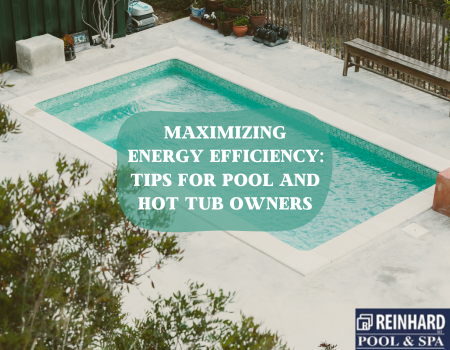As the proud owner of a pool or hot tub, you understand the joy and relaxation they bring. However, maintaining these aquatic amenities comes with its own set of responsibilities, including managing energy consumption. Maximizing energy efficiency not only reduces utility costs but also minimizes environmental impact. Let us look at some practical tips for pool and hot tub owners to optimize energy efficiency, ensuring a sustainable and cost-effective aquatic experience. Whether you’re a seasoned pool enthusiast or a new hot tub owner, implementing these strategies will help you enjoy your aquatic oasis while conserving energy.
 Invest in Energy-Efficient Equipment: One of the most effective ways to reduce energy consumption is by investing in energy-efficient pool and hot tub equipment. Look for ENERGY STAR-certified pumps, heaters, and filtration systems, which are designed to operate more efficiently and consume less energy compared to standard equipment.
Invest in Energy-Efficient Equipment: One of the most effective ways to reduce energy consumption is by investing in energy-efficient pool and hot tub equipment. Look for ENERGY STAR-certified pumps, heaters, and filtration systems, which are designed to operate more efficiently and consume less energy compared to standard equipment.
- Use a Pool Cover: A pool cover is a simple yet effective tool for conserving energy and reducing heat loss. By covering your pool or hot tub when not in use, you can minimize evaporation and retain heat, reducing the need for heating and chemical treatments. Additionally, a pool cover helps keep debris out of the water, reducing the workload on your filtration system and prolonging its lifespan.
- Optimize Heating Settings: Adjusting the heating settings of your pool or hot tub can significantly impact energy consumption. Consider lowering the temperature by a few degrees to reduce heating costs without compromising comfort. If your hot tub has a timer or programmable thermostat, schedule heating cycles to align with peak usage times, ensuring optimal energy efficiency.
- Maintain Proper Water Chemistry: Maintaining proper water chemistry is essential for preserving water quality and equipment efficiency. Imbalanced water chemistry can lead to increased energy consumption due to heightened filtration and chemical treatment requirements. Regularly test the water and adjust chemical levels as needed to minimize energy waste and ensure a clean and healthy aquatic environment.
- Upgrade to LED Lighting: Traditional incandescent and halogen lights consume a significant amount of energy and have a shorter lifespan compared to LED lighting. Consider upgrading to energy-efficient LED lights for your pool or hot tub to reduce energy consumption and enhance ambiance. LED lights are not only more energy-efficient but also offer a wide range of colors and customizable lighting effects.
- Practice Efficient Filtration: Proper filtration is essential for maintaining water clarity and quality in your pool or hot tub. However, running the filtration system continuously can contribute to high energy consumption. Optimize filtration schedules by running the pump during off-peak hours when electricity rates are lower. Additionally, clean or backwash the filter regularly to ensure optimal efficiency.
- Minimize Water Features: While water features such as fountains, waterfalls, and jets add visual appeal to pools and hot tubs, they can also increase energy consumption. Consider minimizing the use of water features or using them selectively during special occasions to conserve energy. Alternatively, opt for energy-efficient pumps and aerators for water features to reduce their environmental impact.
- Implement Windbreaks and Shading: Wind can significantly increase heat loss from pools and hot tubs, especially in windy climates. Install windbreaks such as fences, hedges, or privacy screens to minimize heat loss and improve energy efficiency. Similarly, planting trees or installing shade structures can provide natural shading, reducing the need for heating and cooling during hot summer months.
- Regular Maintenance: Proper maintenance is key to maximizing energy efficiency and prolonging the lifespan of your pool or hot tub equipment. Schedule regular maintenance checks and tune-ups for pumps, heaters, and other components to ensure they’re operating efficiently. Address any issues or leaks promptly to prevent energy waste and costly repairs down the line.
- Consult with a Professional: If you’re unsure how to optimize energy efficiency or need assistance with equipment upgrades, consider consulting with a professional pool service provider like Reinhard Pool Service. Experienced technicians can assess your pool or hot tub setup, recommend energy-saving solutions, and perform upgrades or repairs as needed to improve efficiency and performance.
Maximizing energy efficiency is not only beneficial for reducing operating costs but also for minimizing environmental impact. By implementing these tips for pool and hot tub owners, you can enjoy a sustainable and cost-effective aquatic experience while conserving energy and resources. Whether you’re upgrading to energy-efficient equipment, using a pool cover, optimizing heating settings, or consulting with a professional pool service provider like Reinhard Pool Service, every effort towards energy efficiency contributes to a greener and more sustainable future. For more information and expert assistance with pool maintenance and energy-saving solutions, contact us today and take the first step towards maximizing energy efficiency in your pool or hot tub.
